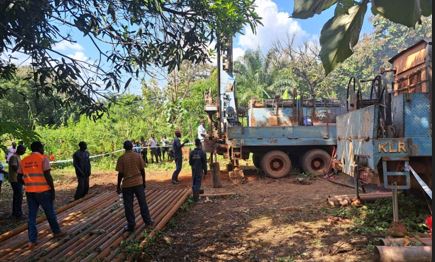GIZ, on behalf of the German Development Cooperation, in partnership with the Catholic Organization for Relief and Development Aid (Cordaid) officially launched the drilling and rehabilitation of new boreholes in Nzara and Yambio counties in Western Equatoria State last week.
According to a press release from GIZ, the aim of the activity is to address water-related challenges for smallholder farmers as well as local residents. In total, 18 boreholes will provide clean, with 7 newly drilled and 11 currently non-functional boreholes being rehabilitated. In addition, 3 rehabilitated boreholes will be upgraded with solar-powered technology.
“An assessment conducted by GIZ in partnership with GOPA/CES in 2023 found that many communities in the counties Yambio and Nzara depend on run-off surface water from streams and rivers, and often lack access to clean water, sanitation, and hygiene services,” the statement reads in part. “Access to clean and safe water and sanitation is a human right and reflected in goal 6 of the Sustainable Development Goals adopted by the United Nations in 2015. The drilling and rehabilitation of the boreholes are supported by the project ‘Food and Nutrition Security and Natural Resource Management – FONA’, which is implemented by GIZ on behalf of the German Federal Ministry for Economic Cooperation and Development (BMZ) and in cooperation with World Food Programme and UNICEF.”
“Working directly with smallholder farmers and cooperatives in Nzara and Yambio (Western Equatoria) and Aweil West and Aweil Centre (Northern Bahr el Ghazal) the project aims to support farmers in increasing their harvest and providing a more varied and healthier diet to their families by boosting the productivity of their farms,” it added.
In addition, the project also works with members of the local communities to improve natural resource management which helps to reduce the negative consequences of extreme climate events. To this end, the project supported the establishment of micro-catchment management committees that developed integrated action plans based on specific catchment areas.
“The drilling of the new boreholes as well as the rehabilitation and upgrading of non-functional boreholes will be done by Greta Ruaha Drilling Company Limited in villages within the counties of Nzara and Yambio,” the statement said.
In South Sudan, GIZ works on behalf of the German Federal Ministry for Economic Cooperation and Development. Germany provides humanitarian assistance and supports the long-term development of South Sudan, above all in the fields of local governance, rural development, sustainable agri-food systems, water and sanitation supply, peace and reconciliation, gender equality, and SGBV prevention.




